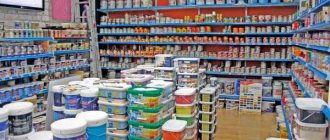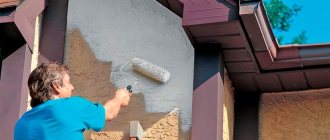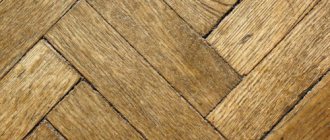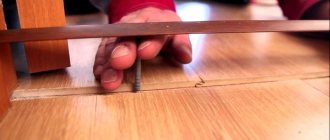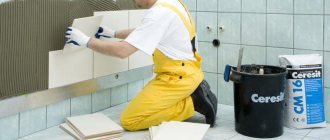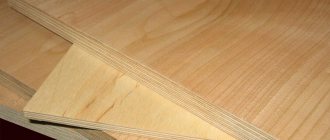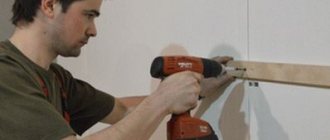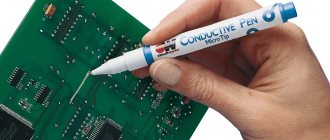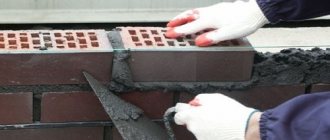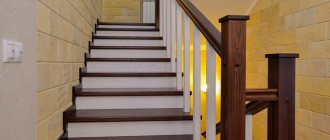Failure to comply with installation technology and the use of the wrong mixture leads to the detachment of porcelain stoneware.
In recent years, the picture of cracked tiles on the facades and staircases of buildings has become too frequent and familiar. We no longer even notice the next opportunity, reflexively attributing the winter “design” to climatic conditions - frost. However, what helped us develop an unpleasant conditioned reflex was not the peculiar geography that even Napoleon could not resist, but the elementary crookedness of would-be specialists, their lack of understanding of the rules for performing external tiling work. In the article we will look at how to avoid the influence of negative temperatures, how to choose frost-resistant tile adhesive (for porcelain tiles and clinker tiles).
Types of adhesives
The best choice always comes with an understanding of the situation as a whole. To decide on an adhesive for exterior use, first familiarize yourself with the types of adhesive compositions and their purpose. The construction market offers the following types of adhesives:
- Universal. He can handle standard tasks: tiling rooms with small and medium-sized slabs, laying slabs outside (except for porcelain stoneware and clinker ceramics). Most inexperienced “users” who have started repairs prefer it without delving into the technological nuances. Despite the recommendations for cladding both inside and outside, you should not subject it to tests at low temperatures, otherwise you may become the culprit for the appearance of another ugly picture.
- Reinforced. This type is suitable for slabs with an area of more than 30x30 cm. If the universal one, despite the loud name, is more appropriate to use when laying wall tiles, this one copes well with the requirements for increased adhesion during floor work, including external ones. But, again, it responds adequately to dynamic and static loads, but not so well to temperature loads, so it is better to do without porcelain stoneware.
- For lining swimming pools (moisture resistant). Prolonged exposure to water has a negative effect on regular glue. The specificity of the application forces the use of a composition that is not destroyed by moisture and does not peel off from the ceramic under hydrological conditions. It is not suitable for outdoor work.
- Heat resistant. The opposite of frost-resistant, it is used when lining fireplaces, stoves and other places with elevated temperatures.
- For non-standard surfaces. Used when laying tiles on wood, metal, etc.
- White. Suitable for cladding with transparent mosaic.
- Frost-resistant. What you need to do outside work in domestic conditions. Any place where there is no constant heating is a “client” of this type of adhesive composition, which fulfills the main requirement - guaranteed resistance to temperature changes. The mixture is based on special additives that promote greater elasticity and adhesion to the base and ceramics, and prevent deformation of the adhesive. Depending on the manufacturer and brand of the composition, frost-resistant glue can withstand up to -50 degrees.
Glue selection
There is a large range of adhesives for tiles, but there are few suitable for use in a swimming pool. Waterproof mixtures come in the form of a ready-made solution and a dry powder. The cost of the latter is lower when compared by consumption. The main ingredient in them is cement, which is packaged in bags and bags.
Solutions have an epoxy, latex, acrylic, polyurethane base, which are poured into jars and buckets.
When choosing products, aesthetic indicators are taken into account. For compositions based on cement, they are low, but where beauty is not very important, such products are suitable. If the owner is design-conscious, it is better to use a ready-made mixture. In this case, choose predominantly white color.
Matching the pool bowl
The choice of glue is greatly influenced by the material of the bowl base. One of the main indicators is the degree of adhesion.
If ceramic tiles are used, compositions are used whose adhesion to the surface exceeds 1 MPa.
Concrete, stone and brick bowls do not create difficulties when facing. They have a rough surface, excellent adhesion, and the tiles are securely fixed. Inexpensive cement-based dry mixes can be used to coat such surfaces.
Polymer materials are often used to make swimming pools. They have a beautiful smooth surface that does a good job of waterproofing and performs decorative functions.
It happens that owners want to improve the design by gluing tiles. Adhesion to plastic is ensured only by polyurethane glue or epoxy resin.
Dependence on operating mode
For the construction of summer pools, frost-resistant mixtures are used. In winter, the water is drained, but the tiles and seams freeze.
If you use waterproof glue designed for above-zero temperatures, it will not withstand extreme conditions.
To make the composition frost-resistant, special additives are mixed into it. When the glue polymerizes, a structure is formed that does not respond to frost by expanding. A popular brand of frost-resistant mixture is Ivsil Aqua, based on cement-sand with polymers.
Adhesive and water purification systems
Swimming pools that are used by many people are often disinfected and the water is disinfected with chlorine. This is an aggressive chemical that can react with glue and destroy it. To prevent this from happening, use compounds that are resistant to chlorine.
Professionals use Ardex X 77 - highly elastic, hardens quickly, which is facilitated by fiber reinforcement and the Ardex E 90 additive.
Comparison of some glue brands
Today in Russia, Ceresit and Yunis mixtures are popular. You might find it helpful to check out a few brands that are suitable for outdoor use. Each company has a wide selection of formulations, most of which are not recommended for use outside in winter. Among those that successfully withstand negative temperatures:
- Ceresit CM 17.
- Ceresit CM 117.
- Yunis 2000.
Ceresit CM 17
The main advantages are excellent adhesion and good elasticity. It is not afraid of moisture and is an excellent layer between the base and porcelain stoneware.
| Operating temperature | Frost resistance | Time reserve for adjusting slabs | Time reserve before performance degradation |
| -50 – +70 | Approximately 100 cycles | Up to 30 minutes | 30–40 minutes |
Ceresit CM 117
He can handle any slabs (except marble) and different types of bases: cement, concrete, lime. In addition to the fact that by default the adhesive is suitable for interior and exterior work, lining pools, etc., the addition of plasticizers allows it to be used even when laying ceramics in outdoor pools. The characteristics will become clear from the table.
| Operating temperature | Frost resistance | Time reserve for adjusting slabs | Time reserve before performance degradation |
| -50 – +70 | More than 100 cycles | Up to 20 minutes | Up to 20 minutes |
Unis 2000
The glue is similar to the mixtures of the previous manufacturer, the scope of application is wide. In the details that the table illustrates, there is a noticeable difference with Ceresit solutions.
| Operating temperature | Frost resistance | Time reserve for adjusting slabs | Time reserve before performance degradation |
| -50 – +50 | 30–40 cycles | Up to 10 minutes | 180 minutes |
All types of UNIS adhesives are suitable for external use, including FIX and Plaster, as well as XXI, produced in Moscow.
When choosing adhesive for cladding facades, open steps, etc., try to ensure that the indicators approximately correspond to those given above. This refers to the first two columns, which describe frost resistance and operating temperature.
Do not neglect leveling the surface before installation.
The thickness of the glue layer also matters. Besides the fact that it is directly dependent on the size of the tile, a thick layer is always worse than a thin one. Approach leveling the surface responsibly. Keep in mind that many manufacturers produce mixtures that can be used when laying in the cold. The lower limit usually does not exceed -15 degrees.
Frost resistance
When purchasing a dry or liquid mixture, you must be sure that during frosts or sudden temperature changes, the paving stones will remain in place and the adhesive will not lose its properties. When purchasing, read the labels; manufacturers often indicate the area of application of the product and the temperature at which it should be used.
To increase frost resistance, manufacturers add liquid glass or hydrophobic additives. If there are a lot of hydrophobic additives, then a minimum of water is needed. The presence of liquid glass significantly increases the number of defrosting and freezing cycles. The purchased composition must withstand 100 cycles of freezing and thawing, while maintaining its original properties.
Attention:
Do not confuse frost resistance and the minimum temperature for using a substance. A substance with a minimum permissible temperature below zero is no different from compositions that must be applied at temperatures above zero.
Clinker and porcelain stoneware
Speaking about mixtures for outdoor use, we cannot fail to mention clinker tiles and ceramic granite. The fact is that only these types of ceramics are suitable for installation in unfavorable (primarily in terms of temperature) conditions. Regular tiles are too porous, which leads to high water absorption. Water at zero temperature turns into a solid state. Pores clogged with liquid can withstand the load for a small number of cycles - the tiles collapse and the adhesive peels off. Even the frost resistance of the latter does not help.
On the left is the structure of ordinary porcelain tiles, on the right is clinker tiles. Due to the presence of pores, clinker tiles remove moisture and do not crack in the cold.
With porcelain stoneware and clinker, water absorption tends to zero, which means that there is no need to worry about liquid accumulation inside the slabs. At the same time, this advantage turns into a disadvantage as soon as it comes to the adhesion of ceramics to the base. Adhesion is ensured primarily by deep penetration of the glue into the pores of the ceramic. This doesn't happen here.
Thus, when solving the problem of choosing an adhesive mixture, we are faced with polar problems. The glue must simultaneously provide excellent adhesion (in conditions of low porosity), be elastic for negative temperatures and withstand repeated (often sharp) temperature changes. But you already have a guideline; modern technologies solve all core problems. The tiler is required to make a competent choice and strictly adhere to technological processes.
The street and low water absorption of porcelain and clinker tiles require some additional effort on the part of the tiler. If when laying ordinary ceramics it is enough to apply glue to one element (base or ceramics), then be sure to coat both elements. This increases the consumption of the mixture slightly, since in one case you can limit yourself to a very thin layer. Apply glue and immediately remove with a spatula. The remaining mixture enhances adhesion like a primer.
Peculiarities
Each manufacturer, to improve the quality and give new properties to its product, introduces additional components. But the main part of the composition is the same for everyone:
- cement, it must be at least M 400;
- slaked lime;
- cellulose thickener;
- additives: quartz sand, limestone, dolomite (grain up to 0.63 mm).
In order for tile adhesive for exterior use to withstand low temperatures, special components have been added to the composition for strong adhesion and durability: plasticizers that reduce liquid exfoliation and increase the tightness of the consistency; water repellents that increase resistance to aggressive influences; modifiers that allow work to be carried out at subzero temperatures.
Outdoor adhesive for clinker or porcelain tiles
When talking about compositions for outdoor use, one cannot remain silent about ceramic granite and clinker tiles. After all, only this ceramic is optimally suited for cladding in adverse weather conditions.
Regular tiles have high porosity, which results in high water absorption. Water becomes solid at zero degrees. Pores clogged with liquid can withstand loads only a very few times, but the material is destroyed and the solution peels off. The frost resistance of the latter will not help even here.
The water absorption of clinker and ceramic granite is almost zero, in other words, there is no need to expect liquid accumulation inside the tiles. On the other hand, this point takes on a negative character when it comes to the adhesive qualities of the tile and base.
Adhesion is primarily determined by the depth of penetration of the glue into the ceramic structure. This is not the case here. And when choosing an adhesive, there is a clash of conflicting interests. At the same time, the adhesive must meet the requirements of increased adhesion (subject to a low-porous structure), good elasticity and be resistant to repeated temperature fluctuations. However, modern technologies have already worked to solve this problem. The tiler can only make the right choice and strictly follow the technological sequence of the process.
In addition, street conditions and low water permeability of porcelain tiles require specific use of an adhesive. If ordinary tiles are laid in such a way that only either the base or the surface of the element is coated with glue, glue is also applied here to both joining surfaces. This, of course, increases the mixture consumption, but not so significantly. Especially if you use a little trick - after applying the mixture to the tiles, immediately remove the excess with a spatula. The remaining film will enhance adhesion like a primer layer.
Paste mixture (mastic) for laying tiles
This category of adhesives is distinguished from others by the fact that they have the lowest cost, but also low adhesive strength and compressive strength. At the same time, the scope of their application is also wide.
“Garant +” mastic For example, “Garant +” mastic is good for laying tiles on simple substrates; its cost depends on the packaging, on average 100 rubles. per kg.
NEOMID Supercontact masticGood user reviews about NEOMID Supercontact mastic. It is intended for lining stoves and fireplaces (price 480 rubles/kg).
Tile adhesive SOUDAL 24АSOUDAL 24А is positioned as a superglue for tiles, and it fully justifies its position (price 790 rubles/6 kg).
Tile adhesive TERRACO TERRAPASTTERRAKO TERRAPAST is a paste-like adhesive that is intended for use on difficult surfaces (plasterboard, plywood, MDF, etc.) – 1200 RUR/15 kg.
Material prepared for the website www.moydomik.net
The advantage of ready-made formulations is that they are already ready for use. There is no need to fill them with water, which ensures the same consistency of the solution, and also makes them more convenient, less labor-intensive, and ensures complete absence of dust during operation.
How to lay tiles on mastic
There is a peculiarity in the use of mastic - they are applied exclusively to smooth, cleaned, pre-moistened surfaces in a thin 2-3 mm layer. Please note that the layer thickness is regulated by the manufacturer. Users do not advise exceeding it, having seen from their own experience that this does not improve the quality of the cladding. But it leads to greater consumption of the mixture and increases the sliding of the tiles (when laying on the wall). In addition, mastic should be applied to small areas intended for cladding, due to the fact that it hardens quickly. Thus, you need to work with mastic quickly.
Special adhesive solutions - liquid nails
Liquid nails for tiles - Moment Installation Universal MP-40, Liquid Nails LN 604 This category of tile mixtures is used when you need to tile a small area or replace several tiles.
Good reviews about the glue Moment Installation Universal MP-40 (price 180-200 rub./pack), Liquid Nails LN 604 (120 rub./pack).
